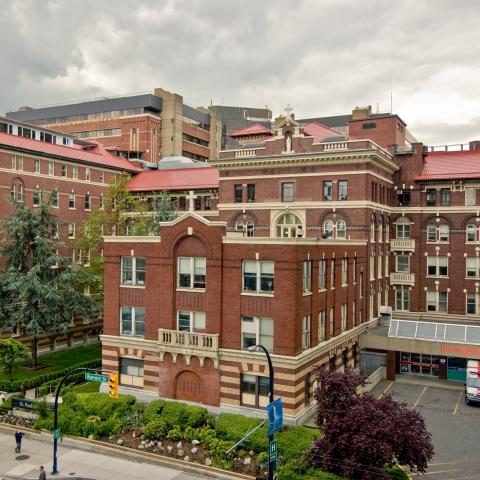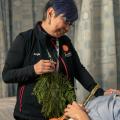Hemorrhoids
An overview of Providence Health Care’s services and resources for adults living with hemorrhoids (irritated veins around the anus).
Overview
Hemorrhoids are swollen, engorged or irritated veins around the lower rectum and anus.
Hemorrhoids can be inside the anus (internal) or outside the anus (external). They are usually not severe but can be itchy and uncomfortable. Hemorrhoids sometimes bleed when someone is passing stool.
Hemorrhoids are caused by straining during bowel movements and prolonged constipation or diarrhea.
Contact
Pacific Gastroenterology Associates
770 – 1190 Hornby Street
Vancouver, B.C., V6Z 2K5
Diagnosis & testing
If you think you have hemorrhoids, visit your health care provider. You may be referred to experts at Providence Health Care.
Once you're referred, we will look to see if your hemorrhoids are external.
If we do not see anything, we will check for internal hemorrhoids with a digital rectal exam. We will use a gloved finger to feel inside your rectum. We will be respectful of your boundaries and sensitivities throughout this exam.
Sometimes, we will use other tests to look inside your lower gastrointestinal tract. The gastrointestinal tract includes all organs that help you digest food. These tests help us rule out other conditions. These tests use thin, flexible tubes inserted through your anus. The tubes have cameras that send images to a computer. They also have special tools to take a tissue sample — or biopsy — if needed.
Typical diagnostic tests for hemorrhoids include:
- Anoscopy for the anal region.
- Sigmoidoscopy for the lower colon.
- Colonoscopy for the entire colon.
Treatment & management
Most cases of hemorrhoids are mild, and you can treat them at home.
Home treatment includes:
- Soaking in a warm bath for 10 to 15 minutes up to three times a day. To avoid irritation, do not add anything to the water, including soap and bubble bath.
- Eating a high-fibre diet to reduce constipation. High-fibre foods include fruits, vegetables, oats, bran cereal, whole grain breads and brown rice.
- Drinking plenty of liquids, especially water. Avoid coffee, tea and alcohol, which are dehydrating.
- Not straining during bowel movements.
- Moving your body frequently. Avoid sitting or standing for a long time. If your hemorrhoids are painful, sit on a donut cushion or lie down.
You can use over-the-counter medicines to treat hemorrhoids. These include pain relievers, as well as special hemorrhoid creams, ointments, suppositories (medication inserted into the rectum) and medicated pads.
If your symptoms do not improve with home treatments after one week, your health care provider may recommend a medical procedure to shrink or remove your hemorrhoids.
At Providence, we treat hemorrhoids with:
- Rubber band ligation — We put one or two tiny rubber bands around your hemorrhoid to cut off its blood supply. Within a week, your hemorrhoid will shrink and fall off.
- Coagulation — We use a technique called "electrocautery" to burn off the hemorrhoid.
In rare cases, we may recommend surgery.
Surgical procedures for hemorrhoids include:
- Hemorrhoidectomy — We remove the entire hemorrhoid.
- Hemorrhoid stapling — We stop the blood flow to the hemorrhoid. This procedure is best for internal hemorrhoids.
Clinics that treat hemorrhoids
Support services
Support for Indigenous Peoples
The Indigenous Wellness Liaison Team is here to support your health journey. Team members offer cultural support and healthcare advocacy. Learn more below or call them at 604-682-2344,62937 or email IWL@providencehealth.bc.ca.
Education & resources
Patient education
Clinical trials & research
Advances in treatments for hemorrhoids and other conditions are all thanks to medical research. While participating in research is a decision you should make in consultation with your care team, there is much activity in this field, so please ask us about our research programs if you’re interested.
By taking part in research, you can help us all learn more about heart disease and find better ways to help people like you live and thrive. While you cannot assume benefit to yourself, your participation can improve care for future patients.
The following clinical trials are currently enrolling volunteers. Please ask your care team for more information or contact the research team listed on each study or trial. For other information about research at Providence Health Care, please visit Providence Research.

